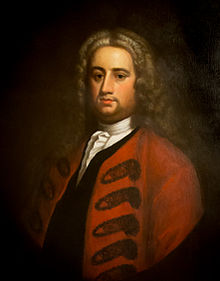Joseph Wanton
| Joseph Wanton | |
|---|---|

Joseph Wanton
|
|
| 36th Governor of the Colony of Rhode Island and Providence Plantations | |
|
In office 1769–1775 |
|
| Preceded by | Josias Lyndon |
| Succeeded by | Nicholas Cooke |
| Personal details | |
| Born | 15 August 1705 Newport, Rhode Island |
| Died | 19 July 1780 (aged 74) |
| Resting place | Clifton Burying Ground, Newport |
| Spouse(s) | Mary Winthrop |
| Occupation | Merchant, governor |
| Religion | Quaker, Anglican |
| Signature | |
Joseph Wanton (15 August 1705 – 19 July 1780) was a merchant and governor of the Colony of Rhode Island and Providence Plantations from 1769 to 1775. Not wanting to go to war with Britain, he has been branded as a Loyalist, but he remained neutral during the war, and he and his property were not disturbed.
Born in Newport of a prominent Quaker family that was very involved in Rhode Island politics, Wanton became a highly successful merchant. He is depicted in the satirical 1750s painting by John Greenwood, Sea Captains Carousing in Surinam, with other prominent merchants and seamen from the colony. As a merchant, he was involved in the trade of most goods, including slaves, and at one point his ship with a cargo of rum and slaves was confiscated off the coast of Africa by a French privateer.
With no known civic background, Wanton was elected as governor of the colony in 1769, and served for six years. With the American Revolutionary War on the horizon, he was involved with a large array of issues and incidents, most notably the Gaspee Affair in 1772, where he played an important role in thwarting the crown from finding the members of the group of colonists that boarded and burned the royal schooner Gaspee. The formation of the Continental Congress took place during his administration, and he was in continuous communication with governors of other colonies. He also became a founder and trustee of the new college in the Rhode Island colony, eventually named Brown University.
As the Revolutionary War approached, members of the General Assembly were getting very hawkish, and when Wanton was elected for the seventh time in 1775, he refused to agree to the raising of an army of 1500 men, and would not commission new officers. He also would not immediately take the oath of office, and for these reasons the Assembly refused to seat him as governor, and formally removed him from office a few months later, with Nicholas Cooke taking his place. While he was not overtly Loyalist, he did not see a war with Great Britain to be in the interest of the colony. He retired to his home in Newport where he was undisturbed during the war, and died before its conclusion, in 1780.
...
Wikipedia
